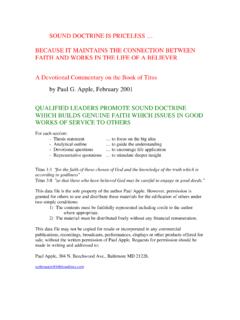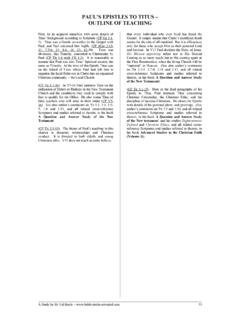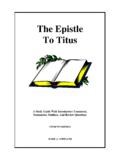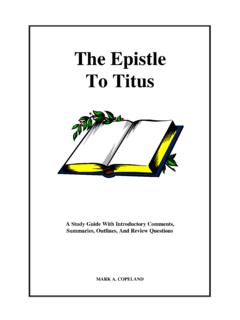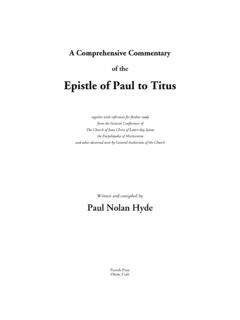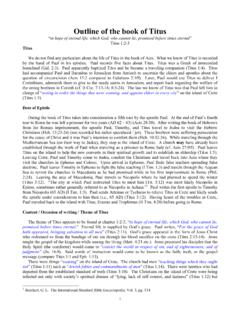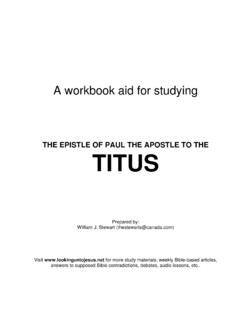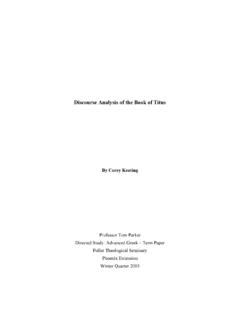Transcription of CHAPTER FIVE PART FOUR SECTION 3 TITUS TO JUDE
1 461 CHAPTER five part four SECTION 3 TITUS TO JUDE The epistle to TITUS Paul had commissioned TITUS to set things in order for the Church in Crete. The believers in Crete lacked leadership and, as a result, were suffering. Because of false teachers who were preaching for dishonest gain, the morals of the congregation were disrupted. Paul relied on TITUS to help them establish their leadership by appointing elders in every city and bringing in sound doctrine. For there are many insubordinate, both idle talkers and deceivers, especially those of the circumcision, whose mouth's must be stopped, who subvert whole households, teaching things which they ought not, for the sake of dishonest gain. ( TITUS 1:10, 11) TITUS was to instruct the congregation on the qualities of a sound Church, focused on Christ and the His coming glory rather than observing a list of rules that have no Biblical support, but come from the commandments of men.
2 Therefore rebuke them sharply, that they may be sound in the faith, not giving heed to Jewish fables and commandments of men who turn from the To the pure all things are pure, but to those who are defiled and unbelieving [in "the faith"] nothing is pure; but even their mind and conscience are defiled. They profess to know God, but in works they deny Him, being abominable, disobedient, and disqualified for every good work. ( TITUS 1:13-16) In TITUS 1:13-16, Paul highlights the asceticism of the Cretan false teachers. They had identified certain foods and practices as defiled when 462 in reality it was their minds that were defiled and unbelieving. These teachings led to the initial corruption of the Church, when Satan placed his "tares" to deceive Christians and corrupt the Word of the kingdom.
3 Satan accomplished this corruption by convincing the Church to become married to the world. Whereas the Church had been separate from the world system under Satan, now it was intertwined within that system of rulership and with all its lusts. This is where the Church finds itself today. This letter to TITUS is as relevant today as it was then. A clear indication can be seen through the deception, divisions and immorality in the Church today. The carnal Christians in Crete were living no different than unsaved individuals. Paul says they profess to know God, but in works they deny Him, being abominable, disobedient and disqualified for every good work ( TITUS 1:16). In order to bring the Church back to the truth, Paul wanted the Church to understand what is involved in attaining their salvation [of the soul].
4 For the grace of God that brings salvation has appeared to all men, teaching us that, denying ungodliness and worldly lusts, we should live soberly, righteously and godly in the present age, looking for the blessed hope and glorious appearing of our great God and Savior Jesus Christ, who gave Himself for us, that He might redeem us from every lawless deed and purify for Himself His own special people, zealous for good works. ( TITUS 2:11-14) The epistle to TITUS centers on the Christian s blessed hope for the coming age. The word hope is the Greek translation (Strong s # G1680) for elpis meaning to anticipate with pleasure; expectation or confidence. The word hope is associated with a mature knowledge of the truth, which is inextricably connected to the Word of the kingdom, having to do with a future inheritance.
5 In TITUS 2:12, there is a connection to the two phrases, blessed hope and glorious appearing; the latter giving further description to the former. Christians who possess this hope are the ones who will be partakers of Christ s glory. For the last two thousand years, God has been looking for a bride for His Son. The bride will be "His own special people" who have produced good works for 463 Christ and who have kept the blessed hope of His "glorious appearing" and of entering His kingdom. The whole purpose of Christ's death and resurrection was to give us this blessed hope, to offer us Millennial life. In TITUS 3:7, the word eternal has been translated from the Greek word aionios. However, in this particular verse, the meaning is derived from its textual usage, not from the word itself. Anionios [from aion, Strong s #G165] refers to a period of time; an age a Messianic period.
6 In this case, the word eternal is best translated age-lasting, referring to the coming age, the Kingdom Age of 1000 years..according to His mercy He saved us, through the washing of regeneration and renewing of the Holy Spirit, whom He poured out on us abundantly through Jesus Christ our Savior, that having been justified by His grace we should become heirs according to the hope of eternal [age-lasting] life. ( TITUS 3:5-7) The change in us must come from within, allowing the Spirit to change our hearts and minds. The blessed hope changes our perspective regarding our desires, determination and purpose. When we have this blessed hope we no longer seek for things on earth to satisfy our flesh, but we seek things above to satisfy and please Him. This is the hope that Paul wanted to convey through TITUS to the Church in Crete.
7 This hope looks forward to the Day when we can partake of Christ s glory in the kingdom of the heavens. In that Day, the kingdom of heaven will resound with beautiful voices. The angels will cast their crowns before the throne of God and they will be given to the saints, the overcomers, who will now rule and reign with Christ on His throne. The overcomers will possess the image and likeness of God, and will be given authority to rule over the earth with great joy and anticipation. As king-priests, the overcomer s work will be the most stimulating and rewarding work imaginable. Imagine what it will be like to dwell with Him and have this most precious and profound life. 464 The epistle to Philemon This short epistle from Paul is addressed to Philemon, Apphia, Archippus and to the Colossian Church, but specifically is directed to Philemon as it uses the singular "I" and "you" throughout the Letter.
8 During the time the epistle was written, a large portion of the population of the Roman Empire was made up of bondservants or slaves. These people were considered property and could be abused and even killed by their masters. But within the Church, wealthy slave owners and their slaves worshiped together as equals. Some slaves were gifted spiritual leaders and ministered the Word to people far above their status (according to the world). The Church evidently was meeting in Philemon's house and he was likely an active leader in the Church. Onesimus, a slave of Philemon, ran away and became a Christian under Paul's ministry. In this epistle , Paul tells Philemon that it was God's plan that Onesimus ran away, as it led to his salvation. Furthermore, he was very useful for the work of the Lord.
9 Paul wanted to keep Onesimus in Rome, helping in the ministry, giving aid to him while in prison. He wanted Onesimus to "minister to me in my chains for the gospel" (Philemon 1:13). Paul told Philemon that he was sending Onesimus back to him for a decision. Now that Onesimus was a believer in the faith, Paul encourages Philemon to view him as a "beloved brother" and no longer as a slave. Before Paul makes his plea to Philemon to keep Onesimus, he first addresses Philemon's faith and love toward his brethren. This is the subject in which his plea would be built upon. Paul was overjoyed with Philemon's love for the Church and that he was sharing his faith in word and in deed. Therefore, Paul pleads with Philemon that he would forgive Onesimus for his transgressions and offered to pay for any loss Philemon suffered because of Onesimus's actions in the past.
10 Paul promises to pay his debt to assure the runaway slave's gracious reception by his owner. Paul wanted Philemon's consent to keep Onesimus with him. As a Christian brother, faithful to God, Paul is expecting Philemon to be compassionate 465 to his former slave and to be obedient to God in this matter. But whether Philemon chooses to do what is correct or not is between him and God. For what does God say about how bondservants and masters should treat each other? Bondservants, be obedient to those who are your masters according to the flesh, with fear and trembling, in sincerity of heart, as to Christ; not with eyeservice, as men-pleasers, but as bondservants of Christ, doing the will of God from the heart, with goodwill doing service, as to the Lord, and not to men, knowing that whatever good anyone does, he will receive the same from the Lord, whether he is a slave or free.
